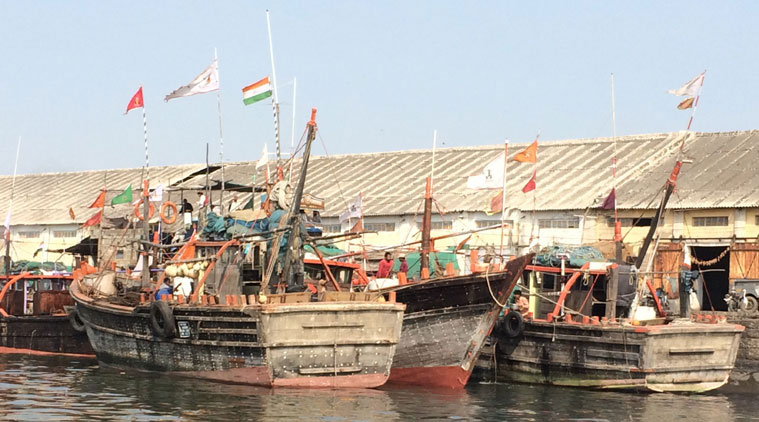- India
- International
Security breach easy where the border is a line drawn in water
Last month, the fishing season began on the west coast, and thousands of trawlers are now strung across the Gulf of Kutch.
 The Gujarat Marine Police patrol boats criss-crossing Porbandar harbour have impractical configurations, and keep breaking down.(Source: Express photo by Praveen Swami)
The Gujarat Marine Police patrol boats criss-crossing Porbandar harbour have impractical configurations, and keep breaking down.(Source: Express photo by Praveen Swami)
His sweat smelled of the muddy home brew he’d been cradling in his arms all evening, but he’s alive with fear, gazing intensely through the dark.
“I saw them right there, on the bow,” says Meru Mulubhai Tandel, the first captain to take the Kuber to sea. “Men with guns and knives. I saw Amarsinh Solanki, begging for mercy as they slit his throat. Believe what you like, I know what I saw.”
Last month, the fishing season began on the west coast, and thousands of trawlers are now strung across the Gulf of Kutch. Every day, some will slip across the international maritime boundary into Pakistani waters, hunting for red snapper and pomfret in the rich Indus-basin estuary.
WATCH VIDEO:
That is just what the Kuber was doing when it was hijacked by the Lashkar-e-Toiba, and used to ferry the 26/11 attack team to Mumbai. For the Navy, Coast Guard and police officers tasked with protecting the coast, the ghosts of Kuber are still alive — and there’s not much they can do to set them to rest.

Crossing the Line
Pravinbhai Charalia, Tandel or captain, of the Samit, a Porbandar-registered mechanised trawler, is one of the men who will be crossing the line later this winter. This trip, which took him a good 40 nautical miles (86 km) short of the boundary, was a good one: the Samit’s hold has hundreds of kilograms of ribbonfish, pomfret and crab, worth over Rs 2.5 lakh. The ship will spend a day in port and refit, while its haul is sent to factories in Porbandar to begin the journey to markets in New Delhi, Mumbai, and the Gulf.
Boat-owners in Porbandar often claim their ships cross the boundary because their mainly-illiterate crews don’t know their locations. Charalia’s detailed haul-book, though, shows that isn’t the case. Each successful cast of the Samat’s nets – and each failed one – are marked with precise Global Positioning System coordinates, valuable information for subsequent voyages.
Each GPS system also has the international boundary marked in, running at a 45 degree angle from the disputed Sir Creek in Kutch, with an option to set alarms when the line is crossed. There’s little chance tides or winds could cause a ship to drift without the Tandel knowing it.
The truth, as Charalia tells it, is a simple one. For the Rs 18,000 a month the Tandel is paid, and the Rs 6,000 his five-man crew will earn, owners expect a haul of at least Rs 2.5 lakh from each trip. There are few second chances for an unsuccessful Tandel. “For us, there is no boundary,” says Charalia. “We have to go where the fish is.”
It isn’t without risk. In October 2013, crew member Naren Sosa was shot dead when the Pakistan Maritime Security Agency, its coast guard, opened fire on the Dhanvantari, some ten nautical miles across the international boundary. Twenty-nine Indian fishermen were also arrested in the course of that operation.
Harendrabhai Narang, Tandel of the Laxmi Prasad-III, is aware of the risks, and also dismissive of them. “Fishermen die every year,” he says, “some because they drown in storms, and others in accidents. I know there is danger when we cross the boundary, but it is not as much of a danger as an empty stomach.”
For owners, too, the game isn’t without risk. The wooden trawlers, fabricated at centuries-old yards in Porbandar, cost over Rs 50 lakh. In 2004, hoping to deter incursions that hurt its own fishing industry, Pakistan began auctioning some seized trawlers – a violation of international law. The bottom line, though, is that owners believes risks of a loss are outweighed by the catch to be had in Pakistan’s waters.
“Look, you must understand that this international boundary is an unfair one,” says Premjibhai Modi, patriarch of the Kharwa panchayat, the owners’ powerful caste-based union. “It has given Pakistan the best waters, and left us with a coast where pollution and the changing climate are reducing the catch every season.”
“India’s Navy and Coast Guard beat up our crews for crossing this ridiculous boundary, and Pakistan fires on us,” says Modi. “For fishermen, anyone in uniform is an enemy.”
For the men in uniform, though, the line across the sea looks a little different. “Every time a trawler crosses that line, it exposes it to the risk of hijacking by terrorists, and for use by organised crime syndicates,” says a police officer. “Every boat confiscated by Pakistan, too, is a potential threat, because someone could use it to infiltrate our coasts. Every time a fishing boat crosses the boundary, it puts the whole country at risk.”
Boat of ghosts
The Kuber, which did just that, now sits rotting in a small channel behind Porbandar’s fishing port, berthed next to a dhow that’s brought in a cargo of figs from Oman. Little noticed by the world, the Kuber returned to the sea on September 16, 2009, less than a year after 26/11, after a Mumbai court ordered its release in return for a bond.
“The first thing I did was rebuild the the little temple in the bridge, which protects the ship and the sailors,” says the trawler’s owner, Vinod Masani. “The dogs who hijacked the Kuber had broken the idols and thrown some into the sea.” The dried-up blood in the engine room, where Amarsinh Solanki had been executed, was mopped clean, and the bridge repainted.
Every month after that, the Kuber set out – and within days, its crew fled, complaining of ghosts. Meru Mulubhai was the first to desert, taking with him the Rs 3 lakh advance he had demanded for the season.
“I did a chandi paath, a Satyanarayan pooja, and every havan every pujari in Porbandar knew,” says Masani.
“Nothing worked.” “People thought I’d gone ghost-crazy,” he recalls, “but the boat’s worth Rs 50 lakh – and it’s useless without a crew.”
For reasons that are unclear, Masani lost his fishing licence, which was valid until August 2012. The Kuber has not been out to sea since. “The government has been demanding legal clearance from the courts that the Kuber will not be required as evidence in future litigation,” Masani says, “but I can’t give them that, since there are no proceedings pending. I’m going to have to go the courts again soon.”
No one in Porbandar knows what happened to the families of the five crew members who were killed by the Lashkar-e-Toiba when the Kuber was hijacked.
Mukesh Rathod’s wife, mother to five daughters, has left her home in Navsari’s Macchiwada; no one knows exactly for where.
Amarsinh Solanki’s family received Rs 5 lakh in compensation from the Maharashtra government, and one of his sons has since been recruited as a police constable. There’s no word, though, on the families of Ramesh Nagji, Balwant Prabhu, and Nutu Nanu Rathore.
“The fishing panchayat gave them each Rs 50,000,” recalls Masani, “and I gave them all another Rs 50,000.”
“The Maharashtra government wouldn’t give them anything, though, because there was no proof they had been killed in its territory, and the bodies were never found”.
None of the men had insurance. Nor do any of the men who head out from Porbandar port each morning.
Apr 25: Latest News
- 01
- 02
- 03
- 04
- 05







































